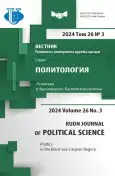Political Processes on the Eurasian Continent: Prehistory and Contemporary State
- Authors: Iskakov I.Z.1
-
Affiliations:
- University under the Interparliamentary Assembly of EURASEC
- Issue: Vol 26, No 3 (2024): Politics in the Black Sea-Caspian Region
- Pages: 466-476
- Section: THE POLITICS OF EURASIA YESTERDAY AND TODAY
- URL: https://journal-vniispk.ru/2313-1438/article/view/322416
- DOI: https://doi.org/10.22363/2313-1438-2024-26-3-466-476
- EDN: https://elibrary.ru/BJXDIU
- ID: 322416
Cite item
Abstract
These days the issues of geopolitical changes in the Eurasian space, which are closely related to the further development of the Eurasian integration process, have become particularly important. The object of the study was the political processes in Eurasia, including the problems of the formation of a multipolar world. In studying them, it was considered necessary to compare the experience of Russia’s advance to the east of the continent and current political and economic events. The work uses scientific works by domestic and foreign authors on the development of relations between the Russian Empire, the Soviet Union, the Russian Federation and the inhabitants of the Great Steppe, as well as new state entities that appeared after the collapse of the USSR. Historical, comparative analytical, transdisciplinary approaches, and other general scientific methods are used for the analysis. The results of the study were discussed at scientific conferences in the countries of Eurasia, at the Eurasian Scientific Forum in St. Petersburg. The analysis made it possible, based on the principle of historicism, to show the influence of political processes and events of the past on the foreign policy of modern political actors in the Central Asian region and their position towards Russia. Attention is drawn to the factors of increasing Russophobia sentiments among the new political elites, which seriously complicates interstate relations on the continent. Attention is paid to clarifying some concepts (for example, “Central Asia”), used in the modern political science lexicon. The presented materials and conclusions will contribute to the objectification of current research and expert assessments of political processes, political actors, changes in political realities in the Central Asian region, as well as the development of interstate, interethnic and interfaith relations here.
About the authors
Irlan Zh. Iskakov
University under the Interparliamentary Assembly of EURASEC
Author for correspondence.
Email: iiel2002@mail.ru
ORCID iD: 0000-0001-6557-4142
PhD in Law, Associate Professor, Rector
St. Petersburg, Russian FederationReferences
- Ageev, A., Kuroedov, B., & Sandarov, O. (2011). Assessment of the geopolitical potential of modern civilizations. Ekonomicheskie strategii [Economic strategies], 5, 22–28. (In Russian).
- Aitken, J. (2010). Nazarbayev and the Making of Kazakhstan. Moscow. (In Russian) [Aitken, J. (2009). Nazarbayev and the Making of Kazakhstan].
- Babkov, I.F. (1912). Memories of my service in Western Siberia. 1859–1875. Demarcation with Western China 1869. St Petersburg. (In Russian).
- Bekmakhanova, N.E. (2015). The annexation of Central Asia to the Russian Empire in the 17th20th centuries. Historical and geographical research. Moscow — St Petersburg: Institute of Russian History RAS. (In Russian).
- Glazyev, S.Y. (2017). Integration of science and education as the basis for the evolution of the eurasian union. Eurasian integration: economics, law, politics, 2(22), 7–9. (In Russian).
- Halperin, C. (1985). Russia and the Golden Horde: The Mongol Impact on Medieval Russian History. indiana university press.
- Halperin, C. (2020). On Recent Studies of Rus’ Relations with the Tatars of the Jochid Ulus. Golden Horde Review, 8(1), 32–50. https://doi.org/10.22378/2313-6197.2020-8-1.32-50
- Ilyin, I.A. (1992). What does the dismemberment of Russia promise the world: Selected articles. Moscow: Peresvet. (In Russian).
- Kazhenova, G.T. (2005). On the issue of the relationship between the Kazakhs and the Siberian linear Cossacks in the second half of the 20th century. In A.P. Tolochko (Ed.), Steppe region of Eurasia: Historical and Cultural Interaction and Modernity. (pp.82-85). Omsk: Omsk State University. (In Russian).
- Kotlyarov, D.A. (2017). From the Golden Horde to the Muscovite Kingdom: The entry of the Volga peoples into Russia. St Petersburg.: Oleg Abyshko Publishing. (In Russian).
- Nisnevich, Yu.A. (2023). Political administration vs political competition under neoauthoritarian rule. RUDN Journal of Political Science, 25(2), 397–422. (In Russian). https://doi.org/10.22363/2313-1438-2023-25-2-397-422
- Panarin, A.S. (2000). Global political forecasting. Moscow: Algorithm. (In Russian).
- Petrov, S. (1893). My first steps in the missionary field among the Kyrgyz. Pravoslavnyi blagovestnik, 3(21). (In Russian).
- Sinkovsky, F. (1884). Notes of the missionary of the Kirghiz mission priest Filaret Sinkovsky for the last third of 1882 and for 1883. Tomsk Diocesan Gazette, 8. (In Russian).
- X. (1947). The Sources of Soviet Conduct. Foreign Affairs, 25(4), 566–582. https://doi.org/10.2307/20030065
- Zhetpysbaev, S.K. (2022). The Great Steppe and the Kazakhs: from a nomadic way of life to a global social civilization. The Bulletin of the Buryat Scientific Center of the Siberian Branch of the Russian Academy of Sciences, 3(47), 58–62. (In Russian). https://doi.org/10.31554/2222-9175-2022-47-58-62
Supplementary files









